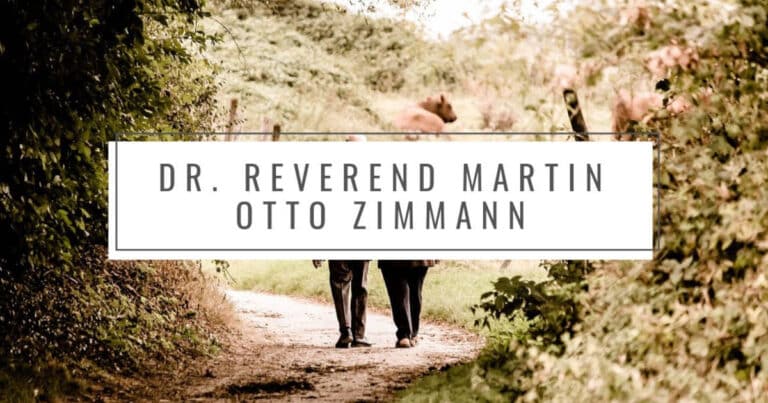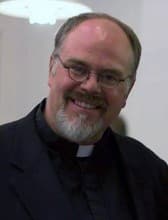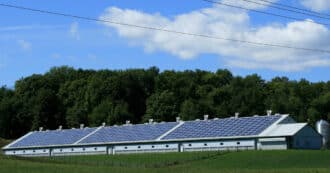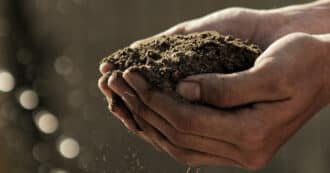Interview by Siiri Bigalke of The Interfaith Center for Sustainable Development
The text below is the full transcription of the interview – a condensed version appears in the video above.
Transcription of the Interview with the Rev. Dr. Martin Zimmann
Siiri: Let’s start with your personal background. How did your interest in becoming a spiritual leader form and how were you first exposed to ministry and sustainability?
Rev. Martin: I come from a long line of Lutheran pastors. Dating back to my great great-grandfather who was a German Lutheran missionary in Michigan in the mid 19th century. My own personal calling to ministry came about in the usual way I felt myself being drawn toward service toward people and also a theology of stewardship, healthy stewardship. And, it began to occur to me that as I spent years in parish ministry that people were working harder but not necessarily living better, that they were consuming resources at an increasing rate but not making themselves happier as a result. I’m beginning to understand that my role as a pastor was one of helping folks understand that healthy stewardship is not the result of acquisition of goods but understanding our place in God’s creation and the harmony that we are supposed to maintain with parts of God’s creation. So I’m very glad that our own family has adopted many sustainable practices. We’ve been able to dramatically reduce the amount of paper goods we use in our home especially those that are harmful to the [environment due to production processes] and, of course, you can’t make more trees out of recycled paper. We’ve been exploring urban farming techniques, raised beds, greenhouses; we’ve had chickens and goats in our yard and have been able to introduce those kind of paradigm shifts to our neighbors in the surrounding communities. This spirit of stewardship is probably somewhat similar to the lifestyle practices of our Amish brothers and sisters. Now I don’t necessarily agree with all of Amish Theology but their appreciation for the resources that the earth provides is much more suitable for keeping with a stewardship of harmony rather than a stewardship or a lack of stewardship where people commodify non-renewable resources.
Siiri: Did you have any exposure to Biblical environmental teachings during your spiritual and seminary education?
Rev. Martin: Typically what you learn in Sunday school is that God created the heavens and the earth and then placed humanity here to have dominion over the earth and over creation. That [understanding] needs a lot of deconstructing because I’m afraid that many Christians especially in America have taken the word dominion to mean, well, do whatever we want with it for the benefit of ourselves. I’ve come to understand that the responsibility we have for creation means that as a species we are at the top of the food chain. If we aren’t here, the earth will be just fine without us. In fact, having dominion over creation isn’t about making creation survive, its about being servants to the creation and learning to live within creation. We’re supposed to be in what I call a lowerarchy. We are at the bottom looking up at all that God has made for this universe. We are supposed to be humble servants not masters and overlords raping and pillaging and taking those things that rightfully aren’t renewable. That they are only here for a little bit of time. I’m very concerned about our use of petrochemicals in industrial agriculture and our Western culture of everybody needs a car that they need to drive whenever they feel like it. These things are going to cause horrible dividends down the road.
Siiri: Are there any specific teachings or scriptures in Christian literature that relates to care for the environment?
Rev. Martin: There is an interesting parable and because we live in a world that is driven by capitalism for the most part, most people tend to deconstruct this particular parable based on an economic basis. But the story of this master who gives resources to the people who work for him then he goes away on a long journey is very interesting because one of the servants buries the money in the ground and the other servant takes what is given to him and doubles it. The other servant does even better with the resources that he is given. The point of the story is to those, much is given. Those who are also able to produce more are pleasing to God. Rightly understood I think this parable is more about not wasting resources that are entrusted to our care, not so much about commodification and building a profit. At the end of the day I think it’s the Christians duty to say to themselves: how much is enough? What is it that I can live with and be content so that others around me can have things as well? So that natural resources– the ocean, fresh water resources, wood and animal life, flora and fauna– how do these things replenish themselves and how can I live in harmony with them? Without taking more than is needed.
Siiri: Can you expand on that a bit and testify to Christians taking care of the land and how is that their responsibility?
Rev. Martin: Well I think it’s really incumbent upon the church right now to have a prophetic voice in terms of caring for the land. I think it’s important for the church and the synagogue and the mosque to understand the cultural and the global paradigm shifts that are occurring in our midst as a result of climate change. It’s my understanding having reviewed the latest report that, the train has left the station. Certain radical global paradigm shifts are happening even if we cut our carbon emissions in half or we do so to the point that there is zero methane from industrial agriculture. We are looking at catastrophic ocean rise , the melting of the permafrost which is going to release even more methane. The complete melting of the arctic ice is creating dark water which creates more negative energy. All of these things are occurring which is going to make the world a much different place for even my kids when they reach my age. It’s not going to be life as we know it. The role of the church, synagogue and mosque in particular is to provide a context where people can come together to understand how these changes are occurring and how best to cope with them and realign our priorities. So as to help the earth heal from the ravages of the industrial revolution.
Siiri: What do you see peoples faith coming together to promote environmental sustainability?
Rev. Martin: Interfaith conversations have to be focused around the wellbeing of individuals regardless of their religious affiliation. Because, in all three Abrahamic faiths we are commanded to care for our neighbor without any regard to their belief system or economic status or their gender. I think it’s made very clear in the Hebrew testament, the Christian testament and the Koran that at the end of the day God is wanting us to love our neighbor as we love ourselves. When we begin to unpack that golden rule, this is where it gets tricky because we have been inculcated through thousands of years of religious differences to a mindset where we ‘other’ people, where we place them in categories that… causes disagreements that cause things like the Palestinian – Israeli conflict. I’m not trying to diminish that conflict or any conflict for that matter but I do think that the larger issues that come to us are commands from God that are being ignored as a result. We have been far too distracted by issues like who controls the resources, who has access to the land and water, who can exploit and make profit from things the quickest. We’re looking at a global population at around 9 billion people and diminishing agricultural resources because of ocean rise and acidification of the ocean waters and less arable land to work with. We are going to see massive population migrations– Bangladesh I think is a prime example. Even the southwestern United States is facing an unprecedented water crisis that will probably cause a migratory shift even within our own country. As a result of this, it is really incumbent upon adherents in all three faiths to put aside those issues that seek to divide us and remain unified under that one command; that is we are not alone we are not isolated we are our brothers and sisters keepers and we are called to live in harmony with our species regardless of our religious differences and also to live in harmony with creation as a result.
This Conversation on Faith and Ecology was produced by the Interfaith Center for Sustainable Development (ICSD). Each conversation involves an interview with a religious figure on their perspective on their religion’s approach to ecological sustainability.
The aim of the initiative is twofold: firstly, to record the spiritual insight of religious and community leaders regarding sustainability, and secondly to ignite interfaith discussions regarding the nexus between spirituality and sustainability.






